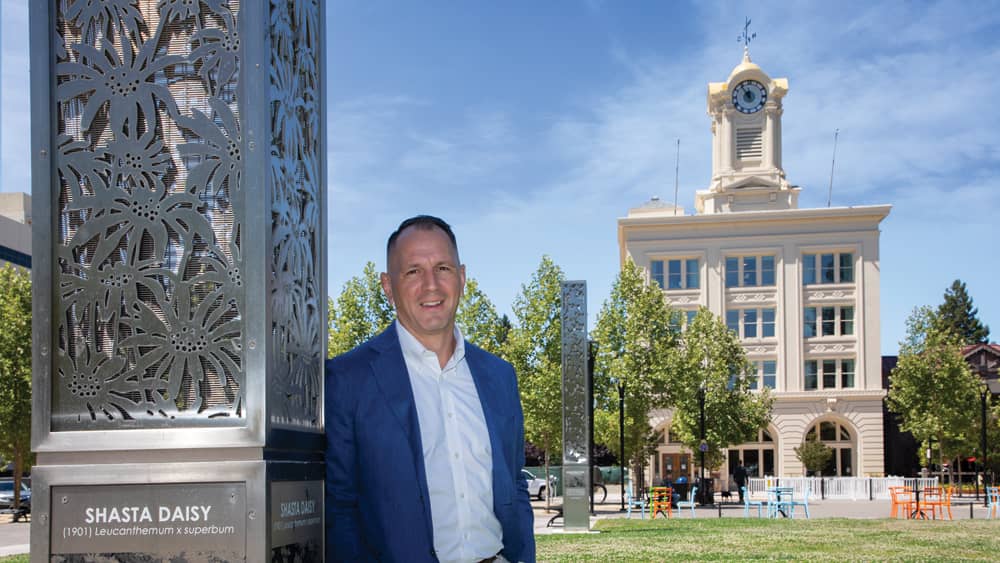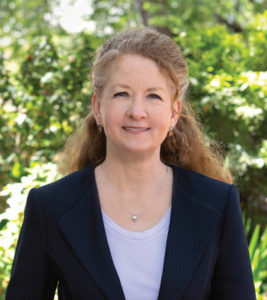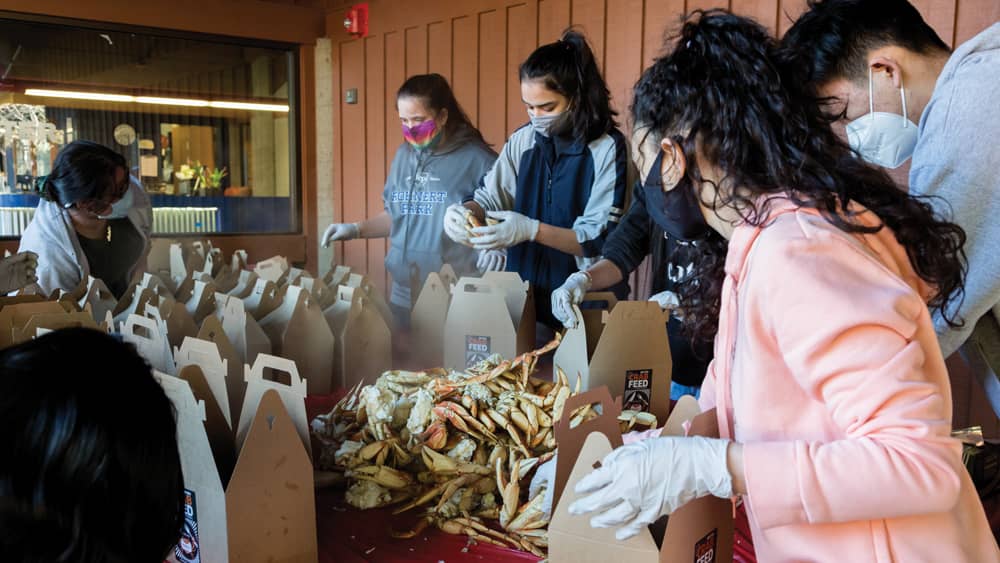
A global pandemic began to rage. Californians were asked to shelter in place indefinitely. “Non-essential” businesses were ordered to close their doors. Bills piled up, rent went unpaid and customers migrated to online shopping to fill many of their needs.
Like the rest of the world, the North Bay muddled through an unprecedented year in 2020, with hundreds of stores and services shuttered and thousands of jobs left in limbo. The region’s chambers of commerce, however, moved quickly into action in the early days of the lockdown to alleviate some of the pain and stress for their members.
“The San Rafael Chamber was the first chamber in Marin County to launch a small business disaster relief program right away,” says Joanne Webster, the chamber’s president and CEO. “We raised more than $250,000 and gave out approximately 70 grants throughout all business sectors. People were scared, wondering how they would pay their rent. The first thing we did was get an influx of cash to these owners.”
Her chamber’s grant model was shared with other chambers in Marin, which helped several develop and start their own local small business grant programs. For instance, she says Mill Valley handed out $1,000 grants because the town wanted to reach as many of their small businesses as they could.
Gathering information for members
Once those early grants were in owners’ hands, the San Rafael Chamber became a digital research and support hub for the federal government’s CARES (Coronavirus Aid, Relief and Economic Security) Act, along with the Small Business Administration’s Paycheck Protection Program (PPP), for retaining valued employees on payrolls, and assistance in applying for unemployment benefits.

“Our chamber team dived into all of this information and communicated it in digestible pieces so that it was easy for any of our members and employers to understand and navigate,” says Webster. “We partnered with the City of San Rafael to keep the info updated and make certain it was current and accurate.”
Her own organization wasn’t immune from the pain; Webster had to lay off one full-time employee, and she and other employees took salary reductions. “That was just the reality of what was going on,” she says. “We also gave our members waivers on their dues for three to six months, knowing that a lot of them couldn’t pay, and we told them we’d collect dues later and not to worry about it. But we still wanted to promote them, so we created an online directory of open businesses.”
Even local governments had to rethink their ways of operating, says Webster, and they can be the slowest to pivot. “I heard the mayor of San Rafael say, ‘We can’t make the same assumptions we’ve always made.’ That really resonated with me, because governments are generally always trying to catch up with the business sector, even pre-pandemic.”
With tenants unable to pay rent, most commercial landlords in Marin County made concessions, Webster says. “I know of only one commercial eviction in the county because most landlords will negotiate with their tenants, they don’t want to lose them. I went to the chamber’s landlord and asked for a rent reduction and they said ‘absolutely’ and with no obligation to pay it back. That helped us save thousands of dollars.”
$150,000 in emergency grants
In Sonoma County, the Santa Rosa Metro Chamber launched into high gear to help its members when lockdowns began in March 2020. “We started making calls to check in with members and find out what the future looked like for them. We asked what they needed, and that continued for many months,” explains Peter Rumble, the chamber’s CEO. “All the chambers in the North Bay got together to draft recommendations to make certain that our small business communities received help, and that included access to capital.”
While there was a lot of momentum at the federal level to issue the first round of dollars from the CARES Act, the legislation wasn’t yet passed, says Rumble. And even when it was finally signed into law [March 27, 2020], he adds, it would still take some time for the money to be moved into banks and then circulated out into the community.
“The period between the start of the lockdowns and the first tangible aid coming from the CARES Act was a significant gap for businesses trying to make their rent,” he says. “For some people, even a couple of weeks of waiting was frightening.”
The Metro Chamber quickly mobilized to create the Small Business Emergency Grants program, with help from the Community Foundation of Sonoma County, Bank of Marin, Poppy Bank and individual contributions from many local stakeholders, such as Sonoma County Supervisor Lynda Hopkins.
Early in April 2020, approximately $150,000 was raised for the grants, which were awarded on a first-come, first-served basis. “To qualify they had to be a locally-based business within the county, not necessarily a member of the Metro Chamber. They had to demonstrate the impact to their business from shelter-in-place orders, and we knew some businesses were less impacted than others. We ran out of funds in 10 days, though we had more than $1 million in requests. That $150,000 was just a drop in the bucket of what was needed, but it made all the difference in the world to many business owners because they were then able to keep going until federal aid arrived.”
Rallying around the mission
Like Webster’s chamber, the Santa Rosa Metro Chamber pivoted to remote work and was forced to make do with less. “We had to cut our workforce in half,” says Rumble, “and we took a significant hit to our budget. Last year, chambers of commerce were excluded from receiving federal [pandemic] aid, but this year’s American Rescue Plan included funding for chambers. We essentially got a two-and-a-half-month injection of capital this spring, which was a significant help. Like for many businesses, it would have been great to get more, but I’ll take two-and-a-half months.”
Supporting its members during such a difficult time was paramount to the Metro Chamber. “Our staff really rallied around our mission,” says Rumble. “As we called our members to find out how best we could help them, deferring dues was popular. We didn’t give a blanket deferment to all members because we wanted to make sure every member had what meant the most to them. So we deferred dues on a case-by-case basis.
“We kept saying all along that two things were needed for our recovery: medically approved vaccines, and a quick and effective rollout of those vaccines. We’ve achieved that, and having the most people as possible vaccinated will only benefit our small business community.”
Reimagining events
The Rohnert Park Chamber of Commerce fared well during the chaos of COVID-19, not having to get loans or a line of credit to continue operating, says its executive director, Lisa Orloff. “Our staff is small but mighty. I’m the only full-time and we have two part-timers. We didn’t apply for any of the funding that businesses could tap into because I felt that the PPP funds should go to the places that needed it. We budgeted that we’d likely lose money over the past fiscal year, but in the end, we made a nice profit.”

Early on amid the lockdowns, Orloff’s chamber partnered with the Napa-Sonoma Small Business Development Center, Sonoma County Economic Development Board and Sonoma County Tourism to quickly get the COVID-19 resources of those agencies in front of its 320 members. “Each week we created three issues of our newsletter for members, to give them the most up-to-date information provided by these partners, who let us use their own flyers and posters early on and continued to do so throughout the pandemic.”
The Rohnert Park Chamber’s annual in-person Business Showcase went online instead of in October—dubbed “Business Showcase Reimagined”—and was available for the entire month to members and nonmembers. The next Showcase is scheduled as an outdoor event on Aug. 18 at the Rohnert Park Community Center. The chamber also offered their mixers and other networking events via Zoom last year.
Among other ways the chamber pivoted to keep some of their annual events going, Orloff and her team turned its crab feed into a curbside pickup operation. “With past crab feeds at the Community Center, we were only able to sell 285 tickets because of the size of the room. With the curbside pickup in February, we could sell 400 crab dinners and still give our customers a good experience. Next February we plan to once again sell 285 tickets for the indoor feed, and offer the curbside pickup option to at least another 100 customers.”
Finding employees
Webster and Rumble both agree that as the North Bay economy moves into recovery mode, and most stores, restaurants and tourist attractions fully reopen, staffing up those businesses as of late June posed a challenge. “The No. 1 issue right now is hiring,” says Webster. “Businesses are having a hard time with it. I sit on the Workforce Alliance of the North Bay [WANB], and we’re working with them to catalog all the workforce development and training opportunities in Marin County.” Her chamber is also planning a Marin virtual job fair in August in collaboration with WANB and the Marin Council of Chambers.
There may be many reasons employees are not returning to their jobs, say the executives. “People who were having a difficult time maintaining a regular paycheck due to restrictions on the hospitality industry very likely moved on to a new industry to have steady employment,” says Rumble. “We’ve also seen some net migration out of the area over the past year, and there’s a whole mix of things contributing to that.”

How many small businesses in the North Bay closed for good because of the pandemic? In Sonoma County, that’s difficult to measure, says Rumble. “There is no requirement to tell anyone you have closed your business, not in real-time anyway. City business licenses can be checked, but those are updated on an annual basis only. In the unincorporated county, business licenses are not required, so there is no standard way to collect this data.”
Safe to shop locally
Webster’s chamber rolled out help to its members in phases and is now in the post-pandemic recovery phase. “This spring the County of Marin brought together all its chambers and came up with a ‘Shop Marin’ promotion, to instill in residents that it is indeed safe to go back into their local stores to shop. With this promotion, we are trying to combat the convenience of online shopping and the profound impact it can have on our local economy.”
With more than 80% of its population vaccinated by late June, Marin County’s employers and businesses are returning to mostly normal operations. “It feels really great to have our chamber door back open and to be having in-person meetings again,” says Webster.
San Rafael Chamber of Commerce: Member Testimonials
Small businesses were hit particularly hard during the COVID-19 lockdowns. These two members of the San Rafael Chamber of Commerce are grateful for the help they received from the organization.
“Aside from attending a few mixers when we joined the San Rafael Chamber of Commerce, we didn’t know how much value the chamber would provide us as a small business,” explains Jan Goldberg, founding partner of Delicious Catering. “During the pandemic, our business was severely affected. To survive, we needed to trim costs as much as possible. When the bill for our health permit came, I called the Environmental Health office to see if we could get all or part of the fee deferred. I knew that the more businesses that contacted them, the more likely there would be some accommodation. I reached out to Joanne Webster [chamber president and CEO], and she brought the issue to the countywide group of chambers of commerce, who saw the value of supporting our request. The result was a deferment of half the fee, with the remaining fee to be paid in three months. I know all food businesses appreciate this. Since COVID-19, we hear people say, ‘We’re all in this together.’ As a member of the San Rafael Chamber of Commerce, we at Delicious Catering know that it is true.”
“As a young girl growing up in Marin, I always dreamed of owning a business in downtown San Rafael,” says Ann Brewer, proprietor of Brewer Phillips Hair Design. “I finally realized my dream in 2001. Building and operating a small business is a huge endeavor for one person, and one really can’t do it alone. I’ve been fortunate to have the help and support of many, including the San Rafael Chamber of Commerce. Joanne Webster and her staff are always there for me when I need them. During the challenging time of closures, they helped us get our voices heard, and hopefully, we will get back to thriving again.”
Pandemic Times: Work on Affordable Housing Continues
Even with all the challenges in 2020 navigating the difficulties of doing business during a pandemic and helping its members stay afloat, the Santa Rosa Metro Chamber was still able to forge ahead in its work on affordable housing.
“We are somewhat unique among chambers of commerce in that we are tackling major systemic challenges to our economic health,” says Chamber CEO Peter Rumble. “Something we never stopped working on during 2020 was moving forward with affordable housing partnerships.”
In a collaborative effort between the Santa Rosa Metro Chamber and the nonprofit community development financial institution Housing Trust Silicon Valley, the Sonoma County Housing Fund was created and has deployed three loans for three separate affordable housing developments in the county. They include Stony Point Flats and Acme Apartments, both in Santa Rosa, and Siesta Senior Apartments in Sonoma, and together comprise more than 200 housing units. A statement released by the chamber said the combined amount lent by the Sonoma County Housing Fund for the three developments is $3.64 million.
The Housing Trust and the Metro Chamber joined together in 2019 to spur the development of critically-needed affordable housing, a need that was exacerbated by the huge loss of homes from the Tubbs Fire in 2017.
“Chambers of commerce usually don’t do this sort of thing,” says Rumble.
Paying Dues Made Easier
If there were any silver linings that came from businesses severely impacted by forced closures, the executive director of the Rohnert Park Chamber of Commerce believes the dues renewal database maintained by Chamber Master was one of them. “Chamber Master is a nationwide service for chambers of commerce,” explains Lisa Orloff. “In May 2020, it revamped its method of processing membership dues by offering monthly payments instead of the usual lump sum for a whole year. About half of our new members have taken advantage of this monthly dues option.”




